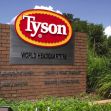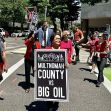Oregon’s largest gas utility faces mounting pressure from the state, and its customers after new lawsuits argue the gas company has been misleading its customers through its so-called climate-friendly program, which instead was allegedly engaging in “greenwashing” and deceptive practices.
Oregon government leaders have been on a mission to hold accountable companies they say are deceiving customers over their eco-friendly operations. The state’s lawsuit originally targeted oil giants, including Exxon Mobile and Shell, for their part in the growing concern over climate change. This month, the state added NW Natural, Oregon’s largest gas utility, to its $52 billion lawsuit.
To add to the pressure NW Natural is facing, the utility’s very own customers have filed a separate class action lawsuit against NW Natural, arguing they were deceived by the gas company’s eco-friendly stance. The lead plaintiffs in the lawsuit, Nicolas Blumm and Claire Gates, are being represented by FarmSTAND Senior Staff Attorney Kelsey Eberly along with David Sugerman and Nadia Dahab of Sugerman Dahab.
The new lawsuit takes issue with the company's Smart Energy Program. NW Natural describes this program as a simple and affordable way for users to offset their carbon emissions. The website advertises that customers in the program “are addressing the carbon emissions from their natural gas use.”
However, the lawsuit claims that customers “paid for carbon offsets guaranteed to mitigate specific quantities of carbon emissions from their natural gas use,” yet “Northwest Natural Gas failed to deliver such offsets.”
The complaint alleges that the program represents a breach of contract under Oregon law. As it is currently set up, the program violates the state’s prohibition on unfair and deceptive marketing claims, according to the lawsuit.
The program, which is touted as easy to sign up for, features various projects. These projects work in collusion with local and regional dairy farms, landfills, and other facilities that produce what is known as renewable natural gas. This is a type of gas that is created from decomposing organic matter. It is mostly made up of methane gas – a known greenhouse gas that is 86 times more potent at trapping heat in the atmosphere than carbon dioxide over a 20-year period, according to FactCheck.org.
Along with these projects, the Smart Energy Program allows customers the ability to purchase carbon credits. These credits go on to increase the number of renewable gas projects the company has going on.
To participate in this program, customers are charged a monthly fee that ranges from 15 cents to $10 a month. The fees are dependent on the tier that a customer signs up for. Whether an individual is a resident or signing up as a business will also determine the monthly cost. NW Natural, which serves over 2.3 million residents, has over 90,000 customers participating in the Smart Energy Program.
Despite the marketing of sustainability, customers say they were misled into thinking this program’s efforts were to limit carbon emissions such as methane, not increase them through customer-funded projects.
Trial lawyer David Sugerman is one of the attorneys representing the plaintiffs in the class action lawsuit. He shares, “We were very quick to find that anybody you asked if you were part of this program, ‘what did you think you were buying?’ The answer would be, ‘I thought I was offsetting my emissions. I thought I was helping. I thought I was doing the right thing,’” Instead, customers were faced with “broken promises and misrepresentations.”
Sugarman goes on to highlight that NW Natural’s efforts to acquire more renewable natural gas are failing, as the company has failed to meet its own goals for two years in a row. In total, the utility has procured less than 1% renewable natural gas to offset its emissions.
Sugarman highlights that the company is engaging in classic “greenwashing.” The company “makes representations about something being environmentally friendly or healthy or good, and it is not,” Sugarman explains. “It drives sales, they can charge premium prices, and consumers wind up spending money on things that they’re not getting.”
Nicolas Blumm, one of the plaintiffs in the lawsuit, says, “I signed up for Smart Energy because I’m concerned about the climate crisis. I was willing to pay a bit more to make a green choice.” He adds, “Had I known what the program really was, I would never have signed up.”






